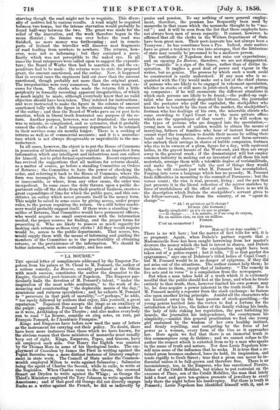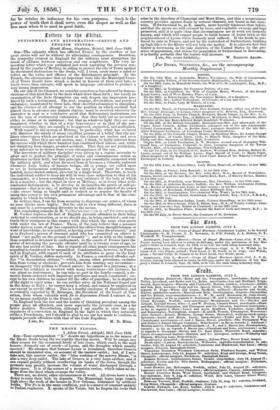" LA BOURSE."
'IKE special letter of compliments addressed by the Emperor Na- poleon from his palace at St. Cloud to M. Ponsard, the author of a serious comedy, La Bourse, recently produced at the Odeon with much success, constitutes the author the dramatist to the Empire, theatrical poet-laureate of Napoleon. The Emperor par- ticularly hails the devotion of M. Ponsard's talent, "under the inspiration of the most noble sentiments," to the work of de- nouncing and counteracting "the deplorable mania of the day," avaricious and ruinous speculation ; and lie exhorts M. Ponsard to "persevere in that path of morality,"—" perhaps," he adds, " too rarely followed by authors that enjoy, like yourself, a great reputation." Napoleon thus accepts the stage as an auxiliary of the pulpit ; appoints M. Ponsard to the ch• f place ; makes him, as it were, Axe bishop of the Theatre; and also makes everybody ran to read "La Bourse, comedic, en cinq actes, en vers, par Francois Ponsard, de PAcademie Francaise:" Kings and Emperors have before now used the man of letters as the instrument for carrying out likoir policy. No doubt, there have been more instances than those which we have known, for the obvious reason that these ministers of monarchs must usually keep out of sight. Kings, Emperors, Popes, and Queens, have all employed such aids. Our Henry the Eighth was assisted by Sir Thomas More in some of his theological books. The em- ployment of Casaubon by James the First m writing against the Papist Baronius was a more distinct instance of literary employ- ment in state work. The Council of State under the Common- wealth employed Milton to write against Salmasius ; Salmasius being the agent of Charles the Second, while in exile, to write at the Regicides. When Charles came to the throne, the crowned Stuart set Dryden to write against the Whigs ; as George the Third's Ministers employed the Tory Johnson to write against the Americans; and if that good old George did not directly engage Burke as a writer against the French, he did so indirectly by praise and pension. To say nothing of more general :smslo/; ment, therefore, the penman has frequently been e monarchs in that cause which the monarchs thought to be " mo- ral " •, and it will be seen from the list that these employes have not always been men of mean capacity. It cannot, however, be affirmed that all the clerks in the Writers Department of State have been great men. Their poet-laureate has not always been a Tennyson ; he has sometimes been a Pye. Indeed, state matters have so great a tendency to run into averages that the litterateur of state may usually be presumed to be a mediocre person. The certificate of Napoleon does not raise our expectations ; and on opening La Bourn', therefore, we are not disappointed. The " comedic " is a sign of the times, rather than of divine in- , spiration. It implies a good deal of power and vigour in the ; writer, but no genius. The process by which such a work could be constructed is easily understood. If any man who is ac- quainted with The City would make out a list of the chief classes I of persons who are likely to be engaged in vehement speculation, whether in stocks or still more in joint-stock shares, or in getting , up companies ; if he will enumerate the different situations in which such persons are likely to be found,—the puffed-up capi- talist who has enormously magnified his fortune the journalist and the poetaster who puff the capitalist, the stockjobber who , knows how to benefit by the turn of the market, the stockjobber's footman who has dealings of his own, the miserable clients who come crowding to Capel Court or to the more private offices , which are the appendages of that resort; if he will reckon up the types of persons who are dragged into the speculation,— young men in search of sudden wealth to obtain the means of marrying, fathers of families who hear of instant fortune and cannot repel the temptation to double their means by selling their , lands and buying shares, domestic servants and farm-servants who embark their savings in shares of bubble companies, footmen who rise to be owners of a plum,e for a day, with equivocal ladies,. in the gayest haunts of the West-end, and then are swept
in away the general crash ; if the dramaturgist will but employ common industry in making out an inventory of all these his raw ' materials, arrange them with a tolevable degree of verisimilitude, and make the " parties " talk the sort of things they would talk,—he will execute just what M. Ponsard has accomplished. Forging into verse a language which has no prosody, M. Ponsard finds difficulties in mounting to the summit of Parnassus; but the verses count ; the vice is real, present, living; and the pen that just presents it in the literal reflection of the mirror snatches by force of truthfulness all the effect of satire. There is no wit in the description which Dubois the stockjobber's servant gives to his fellow-servant, Pierre from the country, of an "agent de change "—
" Ah 1 et qu'est-ce gull change ? DuBois (the footman.) Quelle simplicite! ca n'a vu que sa grange. —11 change . . . . ala minute, et dun coup de crayon, En un million rien, en rien un Prinutz C'est un escamoteirr ? DuBois.
Mais gull eat done candide!" There is no wit here ; but the matter of fact tells for wit, it is so pregnant. Again, when Dubois's partner reports that a Mademoiselle Rose has been caught borrowing from her master's drawers the money which she had to invest in shares, and Dubois exclaims, "La maladroite !" the exclamation might have been taken out of a police-report • but it tells. " faut garder des epigrammes," says one of Deiatour's titled ladies of Capel Court ; but M. Ponsard would be in no danger of epigrams, if they IBA not arise out of the situations. The author cannot help them; he has no share in them, except that of industry. "The comedy in five acts and in verse" is a compilation from the newspapers. But when a man takes hold of a truth which it is extremely needful that the public should feel at the hour, and when he trusts entirely to that truth, then, however limited his own powers may be, he does acquire a power inherent in the truth itself. Nor is M. Ponsard merely a repeater from the stock exchange : he fastens also upon another living principle. Amidst all the exacters who are hurried away in the base passion of stock-gambling,---the young genius hurried into the vortex to find a fortune for the satisfaction of his love the father of the family ricking his lands, the lady of title risking her reputation, the poet forfeiting his laurels, the journalist his independence, the countryman his simplicity,;—amidst this general prostitution we find one young girl sustained by the wisdom of her own healthy instinct, and firmly repelling, and castigating by. the force of her power as a woman, every form of the vice as it approaches her. Here again we feel that there is an immortal truth in this commonplace coup de theatre; and we cannot refuse to the author the respect which is extorted from us by a man who speaks in the name of truth and nature. Nor does Louis Napoleon him- self miss some of the influence that he seeks. It is true that a re- tained press becomes enslaved, loses its hold, its inspiration, and tends rapidly to Grub Street ; true that a press can never be in- fluential unless it be full-grown and therefore free. There is an inconsistency, too, in the Emperor, who has sanctioned Pereire, father of the Credit Mobilier, but ;ishes to put restraint on the excesses of Place, son of the Credit Idobilier, the man that lately held a feast and. gave ten-guinea presents of jewellery to every
lady there the night before his bankru i ptcy. But there s truth in Ponsard; Louis Napoleon has identified himself with it, and so
far he retains its influence for his own purposes. Such is the power of truth that it shall serve even the despot as well as ile free man when it is used in good faith.



































 Previous page
Previous page